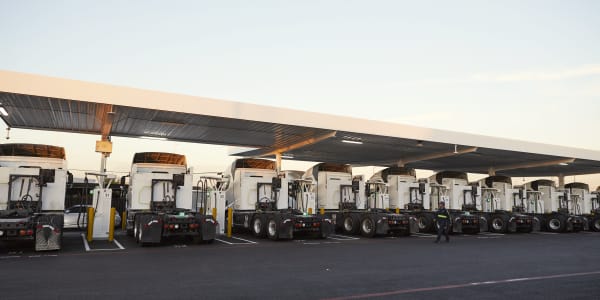Imagine securing a loan in the same way we now hail a taxicab—online and done within minutes. If Vancouver's Mogo Finance Technology has its way, everyone will be able to get access to low-interest-rate loans within 180 seconds by just filling out a bit of information on its site.
The company, which was started by David Feller and his twin brother Greg in 2003, said it's trying to disrupt the credit card and payday loan markets by giving people who are in debt money to pay off their high-interest-rate credit cards. So far, Mogo's only available in Canada, but Feller does want to eventually let Americans use the site.
Read More Meet the 2015 CNBC Disruptor 50 companies
There's no customer service representative and no bank branch to visit—it's all about the user experience, just like Uber, said David Feller, Mogo's CEO.
"If we look out 10 years from now, customers are going to look for an Uber-like experience across the board, including with financial services," he said. "Our software has been designed properly, so there's no need to talk to a rep; it's intuitive, just like Uber."
The idea for Mogo came to Feller after he had trouble paying off his own credit card. Make that numerous credit cards. When he was a university student in his 20s—he and his brother are now 47 years old—he spent money on clothes, food, electronics and a lot more.
He held nearly every credit card that he could—many with 20 percent interest rates—and he wasn't afraid to rack up charges. Before he knew it, though, he was $10,000 in debt and had no idea how he'd pay it off.
"I thought, 'This is cool; it's free money,'" he said. "I ended up with credit card debt for nearly 10 years."
While Feller eventually paid off his balance—mostly because his income rose as his jobs improved—his experience with debt gave him an idea to help others by loaning them money at lower rates.
It's a problem many Canadians are dealing with today. According to Statistics Canada, Canadians owe more than $519 billion in consumer debt, with much of that coming from credit cards.
Delinquency rates on lines of credit—which are often used to consolidate credit card payments—are also on the rise. CIBC, one of Canada's main banks, said that it's credit card debt that Canadians are struggling with most.
Read MoreWhat do rising rates mean for online lenders?
By offering lower-rate loans nearly instantly, the company hopes it can shake up the credit card market, and Scott Chan, an analyst at Canaccord Genuity, thinks it has a chance.
"It does have an opportunity to be disruptive," he said. "Its No. 1 focus is disrupting the massive consumer finance market in Canada, particularly related to credit cards, where billions of dollars are outstanding."
Long-term story
While the company is growing fairly quickly—revenues climbed 122 percent, to $10.3 million year-over-year in the last quarter, and loan originations climbed 137 percent—it still has a ways to go before people stop visiting their nearest bank to get help with credit consolidation.
Since its IPO in June, its stock price has fallen by 31 percent. But so have other similar but slightly different online lenders, such as Lending Club and On Deck Capital, both of which have fallen 49 percent and 57 percent, respectively, since the beginning of the year.
Read MoreFunds rush to pour money into online lending
The reason for the drop is twofold in Mogo's case. One is that investors are concerned about regulation. While Canadian regulators haven't said much about online lenders yet, American regulars have made it known that they want to protect consumers by slowing down the growth of these operations, said Chan.
Investors are also worried about whether or not the faltering Canadian economy, which may be in a recession, will result in an increase in loan default rates. Still, it did pass 1 million loan originations for the first time last quarter, but it will need to process more than the 30,000 loans per month that it sets up now to really disrupt the lending sector.
That will eventually happen, said Chan. He's not as bullish on the business in the short term, in part because it's not yet profitable, but he thinks it will take off over the next three to five years.
"They have to keep spending to make their brand awareness a lot higher, and it's also a high-cost business," he said. "But looking out a few years, if these guys can continue to grow at a rapid pace, then there's a lot of potential."
Building with Big Data
One thing that Chan likes a lot about the company is its technology. Over the last three years, Mogo has invested tens of millions of dollars into a massive big data platform that analyzes more than 1,000 data sources.
While it looks at credit bureau information, it also examines what phone the person is connecting to the site with (Apple users are at a lower risk of default than Android ones, said Feller), what other sites someone has visited, and it may soon read messages posted on social media sites.
This big data platform is one of the main keys to Mogo's success, said Feller. The more it knows about a person, the better it can assess just how at risk that loan will be, and that helps the company determine the interest rate it can provide. All of that data also allows Mogo to process applications as quickly as it does.
It helps prevent fraud, too, which is critical in Feller's line of business. At the most basic level, the software can tell if a person is applying from Canada or not, and if it's from elsewhere else, then that transaction is quickly canceled.
The platform, though, is also what helps replace the face-to-face communication you'd get in a branch. In a bank, the person needing a loan will meet someone whose job it is to assess whether or not this person is really who he says he is. That's obviously more difficult to do when there's no human interaction involved.
By tapping into the various data sources, the software can tell if someone really needs the money or is trying to defraud the system. For example, it can tell how long someone reads its disclosure form on its website. If that person spends too much or too little time reading it then it could signal that they're high risk, said Feller.
Mortgage products ahead?
At some point, though, other operations will build out their own analytics departments. Where Feller thinks it can differentiate itself from its competition is with its products.
It offers what it calls a "level up" program, which automatically lowers someone's interest rate after a certain number of payments are made. It also has prepaid Visa credit cards that people can load right from the site. Its speed of approval is also an advantage it has over others, said Feller.
At some point in the future, Feller would also like to start offering mortgages, which is always a long and complicated process for people to complete. If his site can approve someone in minutes and offer a low rate, then he could make some major inroads into one of the largest areas of lending.
On the surface, it may seem as though Feller is setting up the company to become a bank, but that's not so, he said. Mogo's a tech company first and foremost.
"We're not licensed as a bank, and we don't want to be one," he said. "It's tech platforms like ours, though, which will ultimately be the banks of the future."
—Bryan Borzykowski, special to CNBC.com





